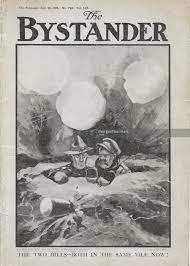Pages
Monday, 10 April 2023
Ada Tessibel Peters, born c. 1901 and Ethel Pauline Peters, born c. 1903 – American sisters who were both poets
With grateful thanks to Historian, Poet and Writer AC Benus* for finding these important poets and their poetry for us
"The sisters were known in the poetical world as "The Peters Sisters." The Peters Sisters have had very limited education. Each of them spent one and one half years in high school at the Institute. West Virginia. Their teacher was Prof. Byrd Prillerman."
By William F. Denny from The Introduction to their poetry collection “War poems” by Ada Tessibel Peters and Ethel Pauline Peters (Union publishing Co., Charleston, West Virginia, 1919).
“PREFACE
The sole intention of the Authors in writing these poems is to show the Negro's loyalty to the Stars and Stripes, in the war with Germany; and to show the need of unity of all men in the fight for democracy. The Authors.” From the sisters' WW1 collection “War poems” by Ada Tessibel Peters and Ethel Pauline Peters (Union publishing Co., Charleston, West Virginia, 1919)
OUR WAR WITH GERMANY. Poem by Ada Tessibel Peters
I.
America and her Allies are now engaged
In a war that freedom might live,
That all nations may not be enslaved
Giving as all True Americans would give
Fighting lest Germany's Kaiser should spread
The spirit of feudalism over the earth,
That the Sons of Liberty may not be led
Captives from the land of their birth.
II.
While foreign field were strewn with dead
With folded arms we merely looked on
'Till the wronged people believed and said
"They are gamblers, in search of coin."
We became apoligist for our neutriality
While an uncivilized war waged on
Devoid of all principle and morality
Urged on by brutes in human form.
III.
When the country of Belgium was invaded
And It's inhabitants tortured and slain
When other defenseless towns were raided
And mines in neutral waters were lain
When the smoldering ruins of France we saw
The home of the world's greatest arts
Then Humanity forced us into this war
For America too, must do her part.
IV.
The Imperial German Government smiled
When the Sussex, and Lusitania went down
Unwarningly murdering American lives
While on peaceful missions bound
Should not this wicked and hideous crime
That sent our friends to watery graves
Help more close our hearts to bind
And strengthen us on our rugged way?
“War Poems” Pages 9 – 10
read the remainder of the poem – pages 10 – 15 here https://archive.org/details/warpoems00pete/page/10/mode/2up
PEARLS UNRECOGNIZED Poem by E. P. Peters.
I.
Oh wandering pilgrims of Virginia,
Who made you noted men.
Whom was ever your defender.
And proved old Glory's friend.
Was it not back in sixteen
For slaves of your selfish will.
When your unfree tongues were still,
You ignorantly bought pearls unseen,
For slaves of your selfish will.
II.
In vales and on historic hills,
Where your gallant heroes sleep,
Once Ethiophians your soil tilled,
From dawn till sunset peace.
Raised grain and your cattle fed,
In your business planned and advised,
Without place to lay their heads
Your own pearls unrecognized.
Your own pearls unrecognised.
III.
From tobacco made you wealthy,
Your cruelty was humbly borne
Slave cooks made you healthy,
Black boys protected your homes,
With maimed bodies and chained hands,
Died to make your sons free,
Rare gems in a slave land.
Robbed of rights and liberty.
From “War Poems” page 48). Read the remainder of the poem on pages 49 - 51 here
https://archive.org/details/warpoems00pete/page/48/mode/2up
Sources: Find my Past and
https://archive.org/stream/warpoems00pete/warpoems00pete_djvu.txt
*AC Benus is the author of a book about German WW1 poet Hans Ehrenbaum-Degele : “The Thousandth Regiment: A Translation of and Commentary on Hans Ehrenbaum-Degele’s War Poems” by AC Benus (AC Benus, San Francisco, 2020). Along with Hans's story, the book includes original poems as well as translations. ISBN: 978-1657220584
https://www.amazon.co.uk/dp/1657220583
Friday, 7 April 2023
A poem by American poet Lucy Larcom published in "Bystander" Magazine in 1917
Although the writer of this lovely poem - found for us by Historian Debbie Cameron - was not alive during WW1 - the sentiments in the poem are fitting for WW1 and it was published in "The Bystander" magazine in April 1917 – which is why I have included it here.
Lucy was born in Beverley, Massachusetts on 5th March 1824. Her parents were Benjamin and Lois Larcom.
After the death of Lucy's father, Lucy's Mother went to work in a boarding house in Lowell, where the girls who worked in Lowell's textile mills lived. Lucy and her siblings found employment in the mills and Lucy wrote about her experiences.
Here is the poem published in "Bystander":
“Do Something” published in The “Bystander”, April 1917
IF the world seems cool to you,
Kindle fires to warm it!
Let their comfort hide from you
Winters that deform it.
Hearts as frozen as your own
To that radiance gather;
You will soon forget to moan,
"Ah! the cheerless weather!"
If the world's a "vale of tears,"
Smile till rainbows span it;
Breathe the love that life endears --
Clear from clouds to fan it.
Of your gladness lend a gleam
Unto souls that shiver;
Show them how dark sorrow's stream
Blends with hope's bright river.
Lucy Larcom
https://www.poetryexplorer.net/poem.php?id=10079926
The "Bystander" was a British weekly tabloid magazine that featured reviews, topical drawings, cartoons, poems and short stories. Published from Fleet Street, it was established in 1903 by George Holt Thomas.
Historian Debbie Cameron is the creator of the Group Group Remembering British Women in WW1 – The Home Front and Overseas
https://www.facebook.com/groups/1468972083412699/



